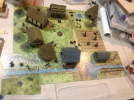chuckdee
Welcome To The Terrordome
- Joined
- Feb 9, 2020
- Messages
- 7,285
- Reaction score
- 19,287
I don't think he has a fixed idea of the story. He's just presenting the players with what's going on- their interactions with it change it. Or they don't interact, and it doesn't.Now, if the author can get away from having a fixed preconceived "story", and let that be what it plays out to be, they could get further away from "narrative".





 .
.

 .
. ).
). .
. ) & that isn't an event that should happen & if the things that lead to ABCDFQU aren't the only (nor even the majority) of content? It might be "extra content in sandbox" for all I care. I used to put such things in, but I called them "Easter eggs" (I've omitted doing that lately, mostly due to being tired and too close to a burnout
) & that isn't an event that should happen & if the things that lead to ABCDFQU aren't the only (nor even the majority) of content? It might be "extra content in sandbox" for all I care. I used to put such things in, but I called them "Easter eggs" (I've omitted doing that lately, mostly due to being tired and too close to a burnout !
!